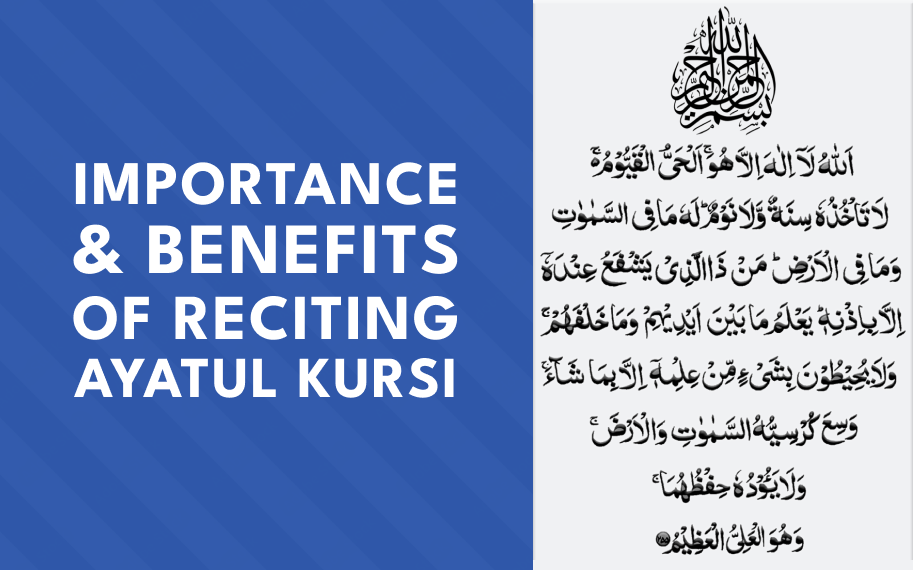
Ayatul Kursi, the 255th verse of Surah Al-Baqarah in the Quran, holds a unique and revered status in Islam. Its recitation is not only a practice deeply embedded in the hearts of Muslims but is also associated with a multitude of spiritual and protective benefits. Here are some of the importance and benefits associated with reciting Ayatul Kursi:
Table of Contents
Divine Protection
Reciting Ayatul Kursi is believed to invoke the protection of Allah. The verse emphasizes Allah’s sovereignty over the heavens and the earth, assuring believers of His encompassing protection.
Guardian against Evil
Many Muslims recite Ayatul Kursi as a means of seeking protection from evil forces, including jinn and harmful creatures. It is considered a powerful spiritual shield.
Enhancing Faith (Iman)
Reciting Ayatul Kursi regularly can strengthen one’s faith and belief in the oneness of Allah. The verse encapsulates the greatness of Allah, reinforcing the fundamental tenets of Islamic theology.
Angelic Presence
It is believed that angels surround those who recite Ayatul Kursi. This presence of angels is considered a source of comfort and protection.
Intercession on the Day of Judgment
According to some traditions, reciting Ayatul Kursi after every obligatory prayer may result in Allah’s protection until the next prayer, as well as intercession on the Day of Judgment.
Forgiveness of Sins
Seeking forgiveness is another benefit associated with reciting Ayatul Kursi. The verse underscores Allah’s mercy and forgiveness, and believers recite it with the hope of having their sins pardoned.
Cure for Illnesses
In some traditions, Ayatul Kursi is recited as a form of Ruqyah (spiritual healing) for those who are unwell. It is believed to have a positive impact on physical and spiritual well-being.
Peace and Tranquility
Reciting Ayatul Kursi is believed to bring about a sense of peace and tranquility to the heart. Many Muslims recite it before sleeping, trusting in Allah’s protection throughout the night.
Connection with the Divine
Ayatul Kursi serves as a means for believers to connect with Allah. Reciting this verse allows Muslims to reflect on the attributes of Allah, fostering a closer relationship with the Divine.
Educational Significance
The verse encapsulates profound theological concepts, making it a valuable tool for Islamic education. Memorizing and reciting Ayatul Kursi is an essential part of a Muslim’s educational journey.

Conclusion
Ayatul Kursi, with its majestic description of Allah’s sovereignty and profound meanings, stands as a beacon of guidance and protection in the lives of Muslims. The spiritual, emotional, and psychological benefits associated with its recitation highlight its enduring importance in the Islamic tradition. As believers continue to seek refuge in the words of Ayatul Kursi, they find not only a shield against adversity but also a path to a deeper, more meaningful connection with their Creator.
FAQs
- What is Ayatul Kursi?
- Ayatul Kursi is the 255th verse of Surah Al-Baqarah (Chapter 2) in the Quran. It is a powerful and revered verse that describes the greatness and sovereignty of Allah.
- What does Ayatul Kursi mean?
- Ayatul Kursi describes Allah’s absolute authority over the heavens and the earth, emphasizing His knowledge, control, and limitless power.
- Why is Ayatul Kursi important in Islam?
- Ayatul Kursi is considered important for its spiritual and protective benefits. Muslims recite it seeking Allah’s protection, blessings, and a deeper connection with the Divine.
- How is Ayatul Kursi recited?
- Ayatul Kursi is recited as part of daily prayers, and many Muslims also recite it before sleeping for protection. It can be recited individually or as a group practice.
- What are the rewards of reciting Ayatul Kursi?
- Prophetic traditions mention various rewards for reciting Ayatul Kursi, including protection from harm, blessings, and potential intercession on the Day of Judgment.
- When is the best time to recite Ayatul Kursi?
- Muslims recite Ayatul Kursi at various times, such as after each obligatory prayer and before going to sleep. It is also recited during times of distress or when seeking Allah’s protection.
- Can non-Arabic speakers recite Ayatul Kursi in translation?
- Yes, non-Arabic speakers can recite Ayatul Kursi in translation to understand its meaning. However, the spiritual and protective benefits are often believed to be more pronounced when recited in Arabic.
- Is there a specific number of times Ayatul Kursi should be recited?
- There is no specific number prescribed in the Quran or Hadith for the repetition of Ayatul Kursi. Muslims may recite it as much as they desire, seeking spiritual benefits.
- Does Ayatul Kursi have healing properties?
- While Ayatul Kursi is primarily recited for spiritual and protective reasons, some individuals believe in its healing properties, both physical and spiritual.
- Can Ayatul Kursi be recited for someone else’s protection?
- Yes, Muslims often recite Ayatul Kursi for the protection and well-being of themselves, their families, and others. The intention and sincerity behind the recitation are considered significant.
Read Also
How to Choose the Right Quran Teacher Online
Why is It Important To Learn Quran Tafsir?
Common Mistakes To Avoid When Learning The Quran
The Role of the Quran in Spiritual Development
Online Quranic Arabic Courses for Beginners
Ways to Implement the Quran in Daily Life

